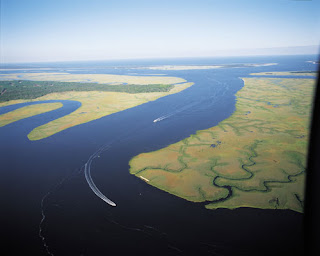
Note: Sustainable Georgia will not air on Saturdays for a few weeks as we step aside for the live broadcasts of The Metropolitan Opera on GPB Radio. The program will continue to air Sundays at 4:30pm and Tuesday nights at 11:30pm. You can also download or stream the program on demand at
here.
Sustainability Pioneer, Guru, Architect and Venture Capitalist
William McDonough was in Atlanta this week, as part of the
Arthur Blank Family Foundation's Speaker Series. GPB and Sustainable Georgia were proud to partner with them on the event bringing McDonough to town. We will be posting his remarks in one form or another, so watch this space for details. We'll also focus on his
Cradle To Cradle initiative as time goes forward. One of McDonough's points in his talk, among many, was that he is a big supporter of nuclear power--nuclear fusion coming from the sun. That's to say he favors the solar energy, the original nuclear power. There are a number of reasons that the solar energy industry is growing by 25% this year when many other businesses are hurting. It's clean, it's free from the source, and it comes without a carbon footprint. We're at a point where the cost of photo voltaic solar arrays and their affiliated technology and hardware is going to begin to drop, even as utilities and businesses using traditional fossil fuel-extracting and burning technologies incur increased real and environmental costs.
Duke Power in North Carolina started an
innovative program in the past year in which they are deploying solar arrays to their customers, allowing their customers to generate their own power. In other states both government and utilities are making real steps towards harnessing solar. In Georgia, not so much. As Myriam Levy reports this week on the program, Georgia Power is offering a limited green option, but as a company is not betting on solar energy playing a major role in Georgia. We encourage you to go to their website
here and learn about what commitment they do have to green energy. In the story, we name-check both
Southface Energy Institute and
One World Sustainable as additional resources if you're ready to start powering your house with the original nuclear energy.
The Right Whales are
back along the Georgia Coast, calving and spuming and otherwise enjoying our sunny Southern waters. We report on the new rule starting December 9, which forces large ships to slow down when sailing through the whales' migratory path.
Our Shout Out this week goes to Robert Whelchel, a Gainesville High School senior who just picked up his 4th, yep 4th, regional student Emmy Award. His psa is entitled Lake Lanier 2008 and encourages water conservation. You can watch it
here.
We lean on Deborah Byrd and our friends at
Earth & Sky for this week's interview with Marine Biologist Felicia Coleman, who talks about the impact of upriver development on our ocean's health. She specifically talks about the impact of Georgia's water crisis and the diminished flow of the Chattahoochee, Flint and Apalachicola Rivers and its effect on the oyster beds of Apalachicola Bay.
Recycled music goes old school Crosby & Nash to celebrate the return of the Right Whales with the title track to their 1979 LP
Wind On The Water. We wouldn't want to celebrate the wrong ones, would we?




















